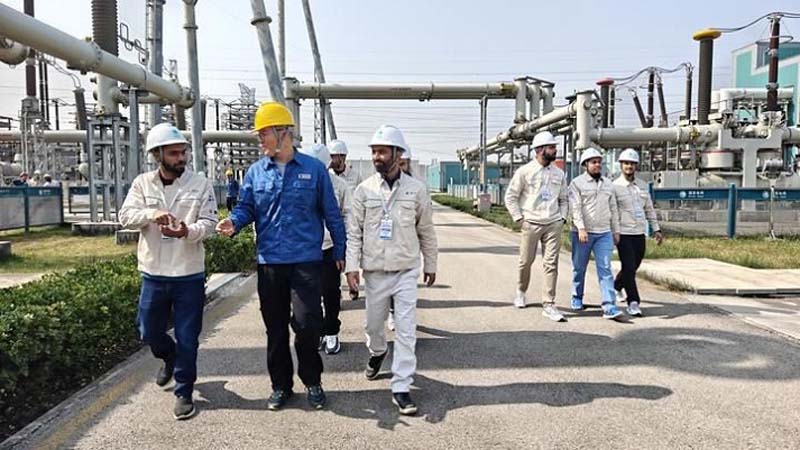Pakistani engineers under BRI lift techniques by training in China
With the help of Chinese technology and equipment in Matiari project, power loss of 886 km-long transmission line has been reduced greatly, says Muhammad Talha.
JIJAN: “I’m really happy to be here in China with my team for our training. It has been a great experience for me to embrace Chinese culture and of course learning technical aknowledges from the best professionals at China’s State Grid Technology College,” says Muhammad Talha, speaking of the one-month technical training.
A supervisor of Matiari converter station of ±660kV Matiari-Lahore high-voltage direct current (HVDC) transmission project under the China-Pakistan Economic Corridor (CPEC), Talha expresses his excitement of his first trip to China to Xinhua.
He is one of the eleven Pakistani engineers who receive skill training in China’s State Grid Technical College of Tai’an city of east China’s Shandong province. The technical training, which started in late October this year, arranged around 55 professional courses including converter station equipment inspection, direct current power adjustment, operation and maintenance of converter station, in order to help them to lift techniques of HVDC operation.
As a key project under the CPEC, a flagship project of the Belt and Road Initiative (BRI), the Matiari-Lahore HVDC project was invested and constructed by the State Grid Corporation of China and started its commercial operation in September of 2021. It has the maximum capacity to transmit electricity of 35 billion kilowatt-hours annually.
“With the help of Chinese technology and equipment in this project, power loss of the 886 km-long transmission line has been reduced greatly,” said Talha, adding that as Karot Hydropower project, Thar Coal Block-I Coal Electricity Integration project and some other power projects under CPEC became fully operational, the Matiari-Lahore HVDC project will play more critical role and will take on large proportion of Pakistan’s transmission capacity from south to north.
Besides the hectic technical training, the participants also have and will visit some Ultra-High Voltage converter stations in cities including Qingdao, Jinan, Linyi of the province, providing them with the opportunity to closely learn about the world-leading Chinese UHV technology.
“I have visited Yinan converter station of Linyi city and Shandong provincial dispatch center. I realized that China’s power construction achievements are very impressive and Pakistan can learn a lot from China,” said Talha.
Rana Shaheer Mehmood, a supervisor of Lahore converter station of the project, said that the technical learning and exchange with China, especially through the ongoing program, allows Pakistani engineers to gain not only the knowledge but also experience that China has gained in the field of HVDC.
Liuhao, a lecturer of the training and also a member of the first batch of operation and maintenance personnel at the project, said that since June 2020, the State Grid Corporation of China has trained more than 120 technical personnel of direct current transmission for Pakistan through online or on-site training, and Pakistani engineers have been able to independently undertake 173 types of operations of HVDC transmission, becoming the major force of operation and maintenance at the project.
This year marks the 10th anniversary of the BRI, as well as the 10th anniversary of the CPEC. The CPEC is now entering a new stage of high-quality development, expanding cooperation in science and technology, agriculture and people’s livelihood. The two sides will work together to build corridors for growth, people’s livelihood, innovation, green development and openness to make greater contribution to peace and prosperity of the two countries and the region.
Speaking of the prospect of the CPEC, Mehmood believes that with continued dedication and cooperation, the CPEC will strengthen relationship of the both sides and open door for brighter future of Pakistan.
“I see the CPEC as a significant and promising venture for China and Pakistan, and it holds the potential to boost economic development, create jobs, and enhance connectivity in the region.” said Talha, pledging that after returning to Pakistan, he will implement the knowledge to work and also train other Pakistani engineers for better and effective operation of the grid in the country.–Courtesy: Xinhua news agency


Comments are closed.